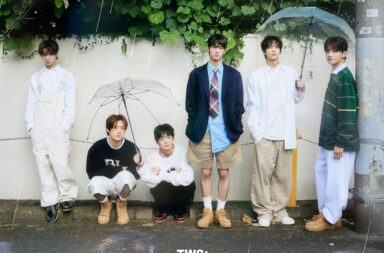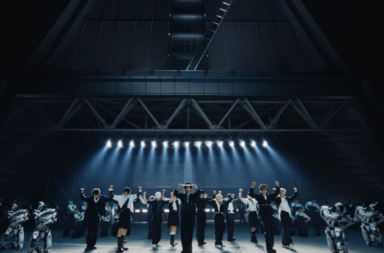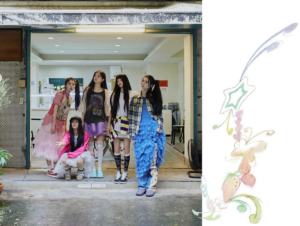
K-pop debuts are always a little tricky to review. Debuts, by definition, are the official introduction of a new performer to an audience. In practice, debuting is not one event but a process.
Debuts have also, over many years, become a reflection of the K-pop industry‘s idiosyncrasies. Disbandments and reorganisation of groups, and solo artists as well as legal and management disputes all influence what is promoted as a debut. The last few years have seen seismic shifts behind the scenes of the entertainment landscape. These production level changes have had a discernible effect on how we’ve been introduced to this generation of k-pop idols.
The success of a debut is based on a combination of factors, mostly related to concept and execution. As Qing explained last year: “The concept should set the artist’s direction clearly, but keep it open. The debut should be memorable, to have some leverage in the waves of K-pop releases we get each year. And finally, the music and choreography should showcase the artist’s skills.” The visibility and brand profile of performers has increasingly become part of idols’ career longevity so that has also been taken into consideration.
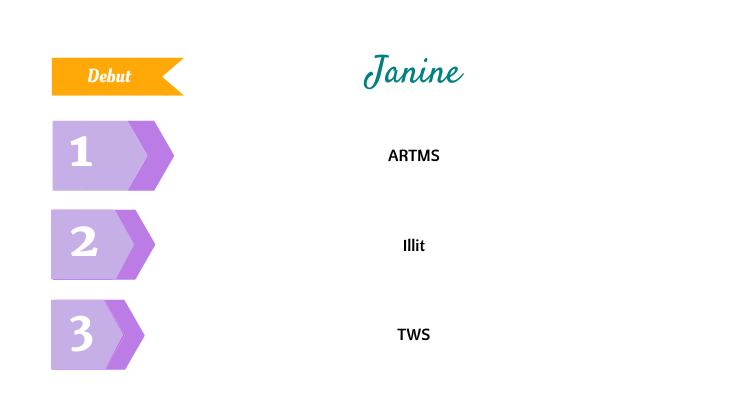
Re-debuting has a long legacy in k-pop. Companies continue to test the idea that there is no second chance at a first impression… especially when business interests have clashed with that of creatives.
Loona’s legal disputes with BlockBerry Creative were finally resolved in 2023. Five previous members debuted in 2024 as ARTMS, a spin-off group under the direction of former Loona creative director and now-Modhaus CEO and founder Jaden Jeong.
ARTMS’ debut EP <Dall> comes after a swathe of “pre-debut” releases. This is typical of Jeong, who masterminded the “Girl of the Month” format that made Loona’s debut a headache to explain to a casual listener. The official debut lead track was chosen by fans from a selection of four tracks. Maintaining fan participation and acknowledging the fanbase has been a key factor to their success. The tone of this debut felt reassuring to loyal fans while still inviting new listeners.
ARTMS’s backstory is a compelling mix of Greek mythology and riffs off of Odd Eye Circle‘s space and moon symbology. The copyright controls won through hard fought legal battles were used to their fullest. The look, feel, and very importantly the sound of the group are familiar, but have developed in very cool directions. ARTMS members are accomplished performers and carry off experimental production choices with confidence. Fans of Loona would find much to enjoy in <Dall>, but there is also potential for new listeners to fall under ARTMS’ spell.
ARTMS shines when the members are allowed to show their connections, charisma, and charm. The album visualiser introduces the music and shows the members’ endearing personalities in a more creative way than a simple reaction video.
Official debut track “Virtual Angel” is, as the title promises, full of tech-inspired production choices, as well as ethereal vocals. The MV is packed with symbolism and imagery relating to the troubled relationship idols have with the double-edged nature of fame and influence. The complex, avant garde editorial choices are matched by the skill of the performers. The tattoos and cult imagery could not have easily been pulled off by green rookies. ARTMS’ bold creative choices show why they’re legacy entertainers and will enjoy critical and commercial longevity.
It is not coincidental that creative risks have felt minimal in year filled with tension between companies and creative directors. The industry shenanigans may have prompted companies to stick to the staples. This crop of debuts have pared back investment in the conceptual ideas of past seasons.
Instead, many have opted to work trends and played to social media. The calibrated presentation of performers has become less about a showcase of innovation, and more about the outcome of a company’s marketing strategy. Dance challenges and astroturfed social media virality are clearly a goal, as songs become shorter and produced to highlight multiple, repetitive hooks.
Capitalising on known quantities can be a good business strategy in troubled times. The most visible debuts of 2024 look like normal mammoth releases, belying the professional turmoil playing out in the corporate realm.
Illit debuted in March under Belift Lab, a sub-label of Hybe, after the members participated in the JTBC’s 2023 survival competition show R U Next? This would be a familiar path for many idols. If only their sub-label were not involved in a corridors of power conspiracy about idea theft!
Illit’s creative director Serian Heu formerly worked as the digital director of Vogue Korea and the fashion editor at ELLE Korea. Heu’s influence on the “Magnetic” concept and roll-out feels very tangible, as the concept is sparse on artistic depth but captures interest with superlative marketing execution and styling.
The song is a TikTok sensation with global stars like Ayo Edebiri, and Tyla hopping onto the trend. The comeback is addicting for many of the same reasons that New Jeans became global sensations. By sharing a nostalgic and minimal sound, emphasis on youth, and influence of dance styles like waacking — comparisons between the groups would have been inevitable even without the lawsuit.
What “Magnetic” doesn’t have is the influence of troubled wunderkind of k-pop creative direction, Min Hee-jin. The world of New Jeans carries a visual and lyrical complexity that Illit’s relatively straightforward ode to an irresistible crush does not appear to share. “Magnetic” has hints of plot in its MV but it could easily be an ad for matching pajama sets. The work coming out of Illit’s camp comes across as executed with a diligently trained focus on commercial success.
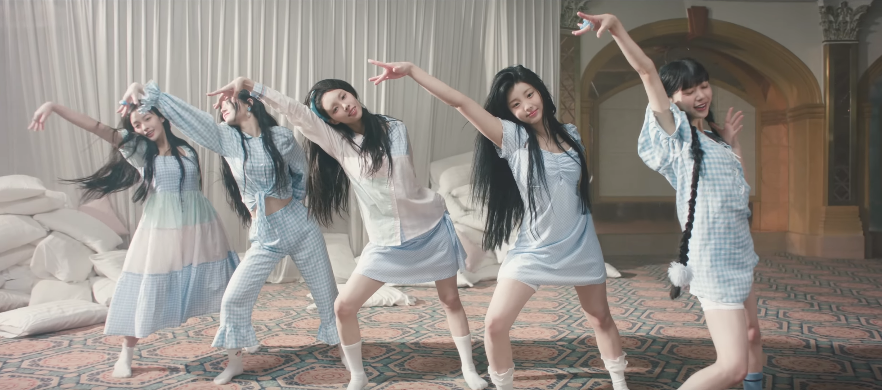
The capitalist machine’s influence on Pledis Entertainment can certainly be felt in TWS‘s blockbuster debut. Founder and CEO Sung Soo-han has presented the group, “twenty-four-seven with us,” as the heirs to Seventeen‘s empire. The “boyhood pop” sound doesn’t have genre specifications other than being concerned with masculine youth, but it’s for people who enjoy Bumzu-produced tracks.
TWS is refreshing, upbeat, and energetic. The members’ personalities and the performances are easily likeable. Everything about their concept and execution feels like a reliable investment. TWS pulls off commercialism with impressive charm for newbies, and they stand out as performers despite needing to stick to a strictly defined script.
The strengths of TWS’ debut are also a display of Pledis’ considerable assets. The dancing, music, and packaging are clean and professional. The members excellently carry off a their high-teen routines and promise to be consummate entertainers.
TWS’ brand and marketing presence has been ambitiously positioned. A collaboration with FC Barcelona was announced in June to promote the team’s merchandise. A tenuous link was drawn to athleticism and trying to capture the interest of boys, but the writing is on the wall: brand partnerships and commercial interests are a big priority. Audiences are being asked to adapt as the K-pop production cycle is expanding into other industries. Instead of creativity, we are being trained to expect more product placement.
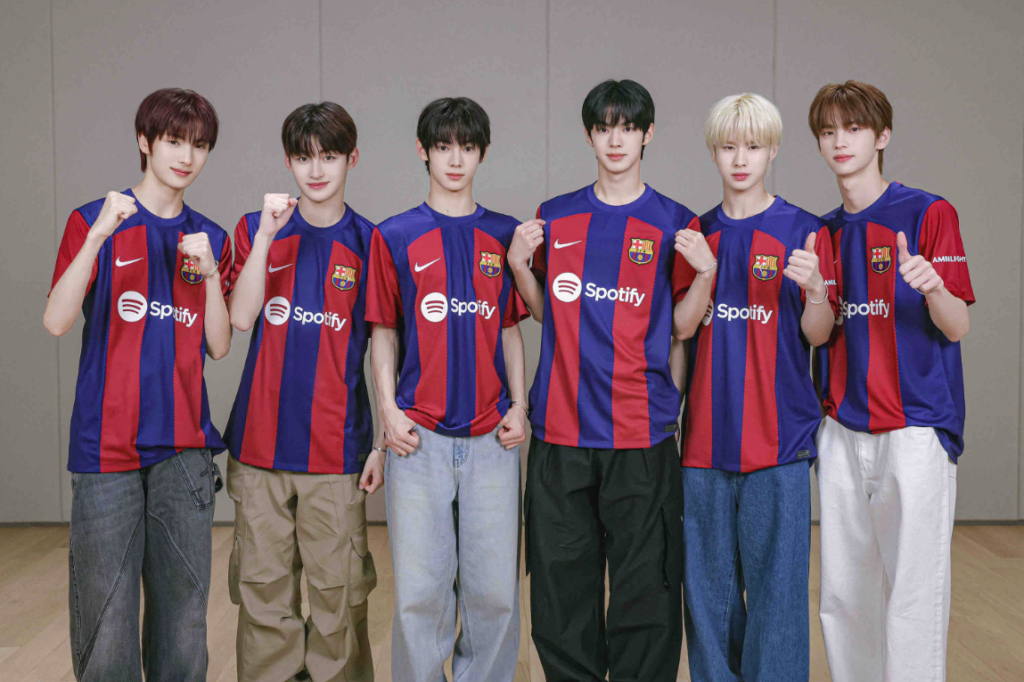
The business interests and legal tussles aside, the first half of this year has seen some very competent debuts. The debuts of 2024 carry the clear fingerprints of their creative directors and point to a mix of industry successes and risk mitigation strategies. An era of compromise seems to be appearing on the horizon. One can only hope that business interests don’t eclipse creative possibilities as the world wakes up to K-pop’s branding potential.
(YouTube [1], [2], [3], Korea Times, Images Courtesy of Modhaus, Pledis Entertainment, and Belift Lab)

